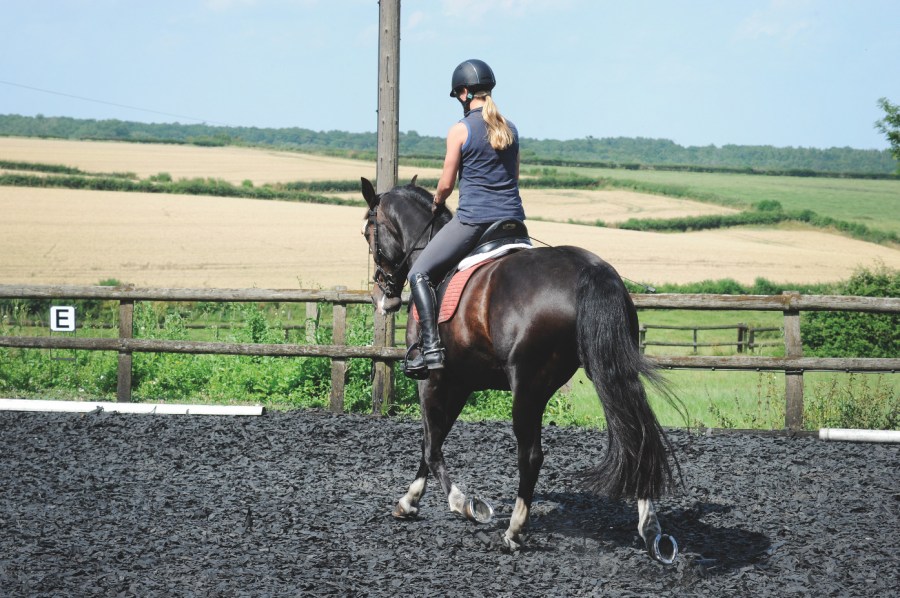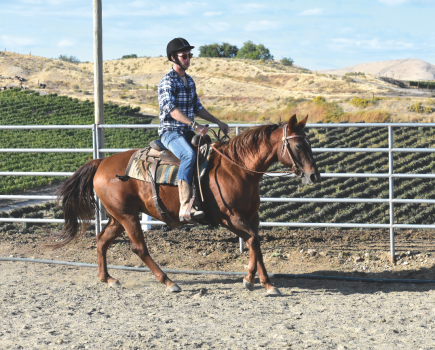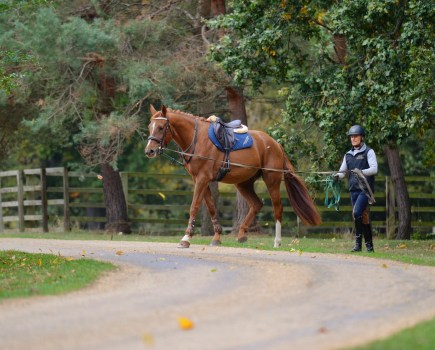Tension, feeling stressed, anxious and generally lacking confidence in yourself and how well you ride your horse is a common them among riders and owners alike. Sometimes, riders can function perfectly well in their daily life at home, in the workplace and even on the yard, but they don’t fully enjoy riding, competing and being with their horse in general.
“I’m seeing more and more equestrian clients who can function and get on with their lives, but have a sort of invisible malware running through their brain, which is hindering their enjoyment of their horse and riding,” says Tracey Cole, an equestrian mindset master coach and accredited trainer of equestrian NLP/equestrian hypnotherapy and other mindset modalities. “The constant worry and striving is subtle to the outside, but to sufferers, unless it’s pointed out that they have high functioning anxiety, they live on their nerves.”
Here, Tracey explains what high-functioning anxiety is, why there is so much of it in the horse world and how to recognise whether you might be suffering from it.
What is high-functioning anxiety?
High-functioning anxiety is not recognised as a clinical condition. It’s not an anxiety disorder, however, those suffering from tension and stress know that it impacts their lives on a daily basis.
Although you are able to function — i.e., work, deal with your personal and business finances, look after your family, children, horses etc., — and even continue some semblance of normality, equestrians with this condition are emotionally, mentally and physically drained for the majority of time.
In fact, if you continue to push on through, you may suffer more seriously debilitating problems longer-term.
Because high-functioning anxiety isn’t recognised clinically, its symptoms can overlap with other anxiety issues and can also be vague and different for each individual.
Who is more likely to suffer?
People who may be more susceptible are those who were shy as children or had ‘gymkhana parents’ or have suffered a trauma or have a stressful work life.
If you find yourself agreeing with some or all of the symptoms listed below, seeking the support of a mindset coach or sports psychologist may help to overcome the constant worry and irritation. Alternatively, having an awareness of the symptoms and changing your thought pattern and actions can break down old anxiety habits.
Symptoms of high-functioning anxiety
1 Worrying what other people think
Perhaps you worry that people don’t like you or that people are judging you negatively. In equestrianism, this is very common. It may be others on the yard who seem to be highly critical or that you feel under pressure when people watch you ride.
If you only switch on this type of worry in a certain environment and can remove yourself from that environment easily, it’s unlikely you have high-functioning anxiety.
Having on-going concerns that you aren’t enough or aren’t good enough in different environments needs you to dig deep and ask yourself:
- “What factual evidence do I have that I’m not good enough?”
- Now, “What factual evidence do I have that I am good enough?”
Weigh up the argument. While some ‘evidence’ feels more significant, is it that it’s emotionally charged rather than actually having some credence?
2 You have constant dilemmas and inner conflicts
This means you struggle to make decisions, because you are thinking about how your decision affects a variety of different people. You may be ‘mind-reading’ what they will think of your decision. You jump to negative conclusions and hide away from making a decision if you can.
Notice when you are ‘mind-reading’. This is thinking you know someone else’s thoughts, without really knowing them. Avoid doing it, because humans aren’t very good at this! We do have super intuition, but our ego is powerful and often drowns out any intuitive thinking.
3 Your personal boundaries are weak
When this is true, you try to people-please. From hating to say ‘no’ and putting yourself out, you would rather go out on a limb for someone to ‘save’ them than admit you simply cannot help this time.
Do any of the following sound familiar?
- Maybe you help people for free when you know you should charge
- Maybe you’re a full livery who acts like a DIY livery
- Maybe you’re the one to bring every horse in when the weather turns bad because nobody else could possibly get to the yard. No matter how tired you are, you’re never late to the horses — you wouldn’t want to let them down either!
Saying no is actually very liberating and people will stop draining you of time, money, energy and effort. Say no as early as possible, so that people know what you’re thinking from the start.
4 You find it hard to relax, even when you take a break
Unwinding isn’t easy for you and you may need a longer break to really forget the everyday. Notice that overworking and overdelivering is a habit that has taken its toll on you.
The mind will feel a little depleted as the habit isn’t running, but in that case, the mind is flexible enough to start a new habit. One where you stop taking on too much. Inactivity for you is actually the most productive and mind-settling thing you can do.
5 A new task or project has to be finished at lightning speed
As a workaholic, a person who constantly overdelivers, you have a strong need to please and to prove yourself.
Remember that breaks are for maximising efficiency and there are no bonus points for finishing a project early. Simply aim to be on time.
6 The need to prove yourself never ends
Speaking of needing to prove yourself, this will be ongoing. There’s never a time when you feel like you’re at the point where you want to be. Whether that’s at a level of riding or a consistent stream of results or, if involved in an equestrian business, it’s striving for better or bigger, there is never an end.
There is a healthy desire to become better and improve, but this is an obsession with constantly proving yourself, without taking any time to celebrate the wins, no matter how small.
Take the time to reflect and enjoy the successes, however minor, on a weekly basis.
7 You feel a strong need to control in all areas
Equestrianism is a unique sport in having a sentient partner to work with. Control may not be the best way to get the best out of the partnership you have with your horse.
Some riders feel that any small movement that a horse makes – like a spook – means that they have no control. Assuming the rider is competent enough, the absolute need for control is unnecessary.
There may also be a need to control the yard, any yard politics, dramas or there may be times when issues are avoided, such as someone who wants to ride, yet doesn’t. In this case, it’s too stressful to acknowledge what’s going on inside their head.
While control the controllables sounds trite, there is so much truth in it! Rather than being in control, be empowered with your mindset. Learn to recognise what’s really not controllable and let go.
8 You often compare yourself to others
As well as comparing to others, you also judge yourself too harshly. Whether it is your fellow competitors, or the stomach-churning envy of someone’s horse/tack/lorry/finances, you can’t help but put yourself down.
Learn to accept that they are on their journey with all their testing times and you are on yours.
9 You fear failure
You have a deep-set fear of failure, which could mean that you see failure as missing out on a placing or not having a fantastic lesson each time. Anything can be considered something to analyse for possible failure.
You cannot perceive failure as a big step upwards, as in a leg-up of learning. You need to start to accept that there is no failure, only feedback!
10 You’re a perfectionist
Note that this is the maladaptive type of perfectionism; the type that brings on anxiety, worry and not feeling good enough. Whilst aiming for excellence by making small, progressive steps is healthy (but maybe too slow for you?), the flipside of perfectionism may leave you tearful and in distress.
The latter type of perfectionism can be alleviated by chunking tasks into sub-tasks and only working on one sub-task at a time.
How many symptoms sound familiar?
If you’re noticing these types of thoughts and behaviours and wondering if you might be suffering high-performance anxiety, why not try NLP or hypnotherapy to help you to focus your thinking and enjoy life more? It could be the best thing you ever do for yourself!
Subscribe to Your Horse Magazine – the perfect Christmas gift!









